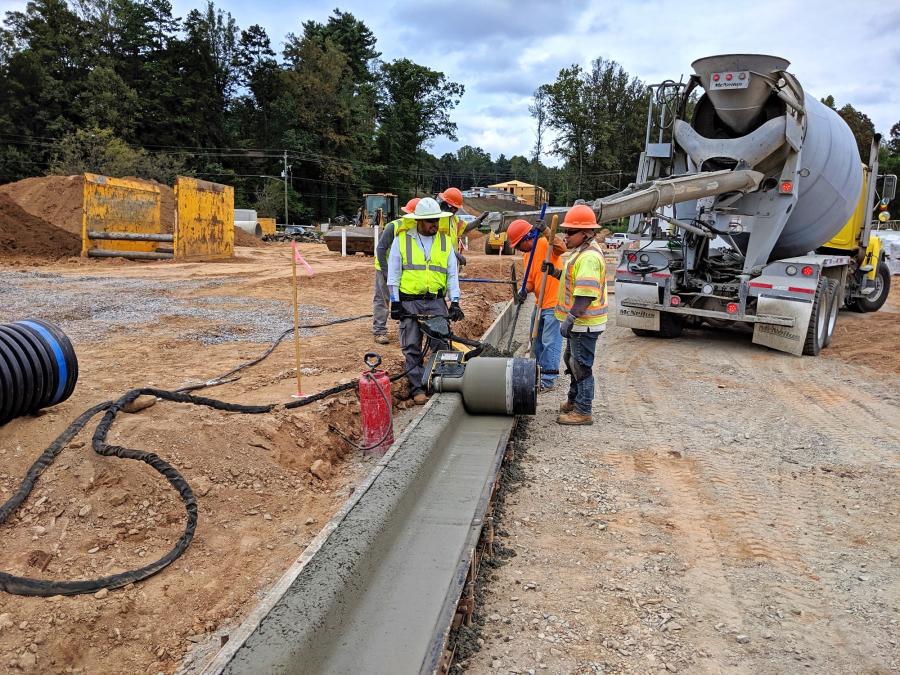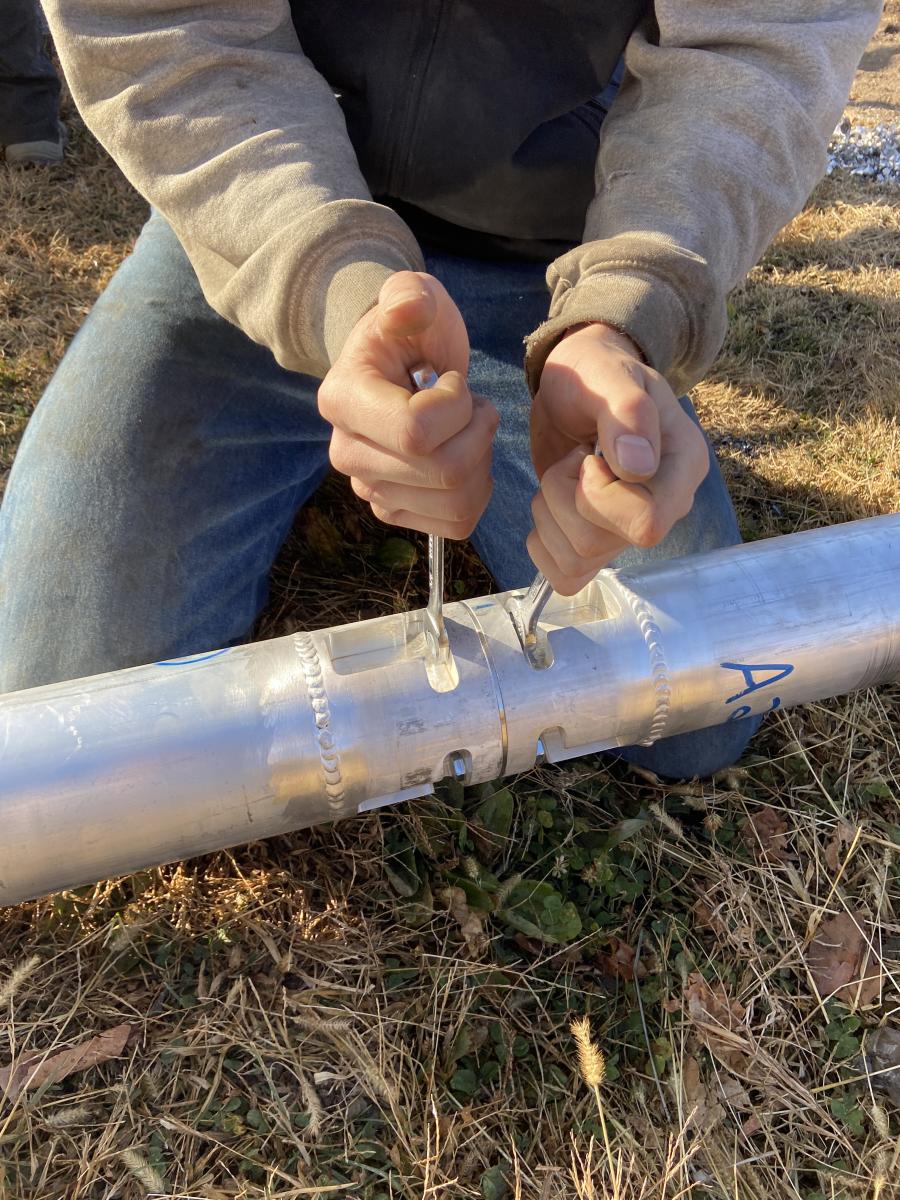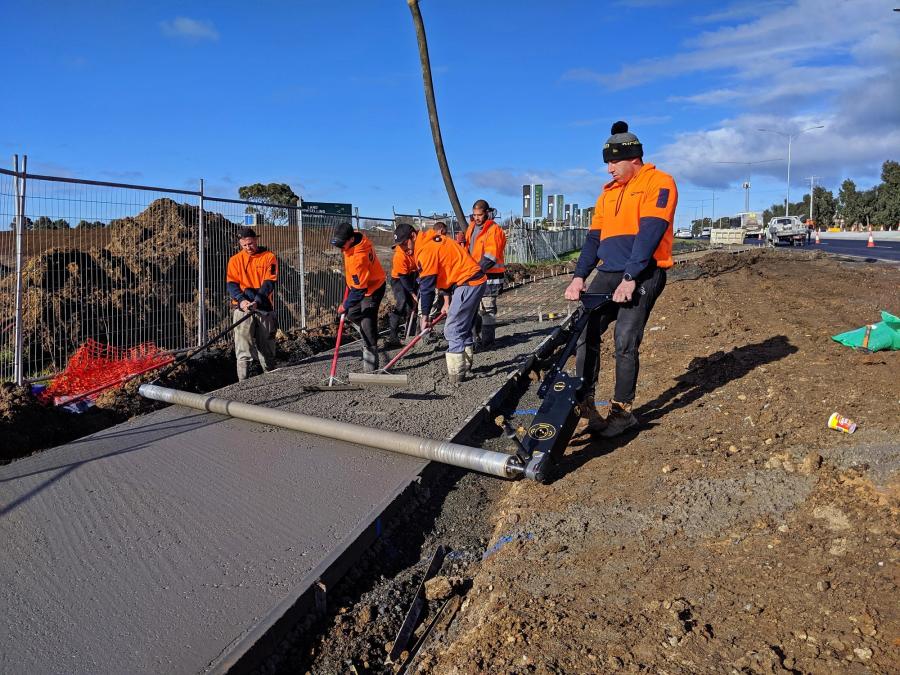Curb Roller Manufacturing’s curb roller CM4000, a single-operator machine for shaping concrete, reduces the labor of shaping curb and gutter pours, allowing crews to complete work up to twice as fast as manual methods or face forming.
From new technology and safety enhancements to shortages in the workforce and supply chain, the construction industry is consistently evolving in response to developments and challenges in the marketplace.
Concrete paving is no different.
Just as contractors have been perfecting the art of placing and finishing concrete for years, their businesses are shaped by the market conditions around them.
Concrete equipment has evolved as well, and new developments provide great solutions for contractors looking to respond to industry challenges and trends. Let's take a look at some of the biggest questions contractors facing in the concrete paving industry today.
What trends are impacting the concrete paving industry?
The concrete industry — like many others — is facing strong demand while also experiencing limited access to equipment and raw materials. Concrete contractors have more logistical limitations than they have had in the past, one being yardage limits on concrete from the plants that produce it. Contractors must often wait weeks to access concrete, while in the past they could schedule it within a few days.
This requires contractors to be on top of their game when it comes to scheduling and efficiency. It's becoming even more important for concrete contractors to work with efficient standardized equipment that can expand the amount of yards poured they can complete within their limited time slot.
Additionally, equipment has increased in cost and availability has become a challenge. Concrete contractors are looking for manufacturers that can ship quickly and equipment that can expand their capabilities and reduce their costs with minimal maintenance and downtime. This is one of the reasons Curb Roller Manufacturing has introduced its new Lynx roller screed system.
With connectable pipe sections, the screed is versatile and can handle a variety of pour widths without needing to purchase specific pipe lengths. This can be a big cost saver with the rising cost of aluminum. It's also easier and less expensive to transport because the pipe sections can disconnect to reduce the overall length, allowing a contractor to carry it in the back of a standard pickup truck or on a pipe rack.
How can contractors address workforce shortages?
Advancements in concrete equipment provide ideal solutions for contractors who are impacted by labor shortages. Simply using equipment that is intuitive and doesn't require in-depth training can help contractors accomplish a high-quality product with less experienced crews.
Roller screeds, for example, reduce the expertise that's often required with concrete labor. Because the roller screed rides on predefined rails or forms, it gives the supervisor or foreman on a crew the ability to ensure the job is being done correctly to achieve a flatter finish. As long as the screed is running on both of the screed rails or form points, a uniform flat surface is almost guaranteed.
Other methods, like vibrating or wet screeds, require higher supervision because they can be difficult to operate and tend to produce inconsistent results when operated by less experienced crew members.
With equipment that is adjustable, convenient and easy to operate, contractors also can take on more jobs than they may have previously. With the right equipment, contractors can react quickly to what they are seeing in the market and broaden their horizons through mechanization rather than needing to hire additional employees.
What safety advancements are being incorporated into concrete paving equipment?
One trend related to safety is that contractors are turning to smaller, manually operated concrete equipment. Many job sites aren't released entirely when it's time to do the concrete work — there are other contractors, subcontractors and tradespeople working on other aspects of the job at the same time. The ability to use smaller equipment produces a safer work environment in highly congested job sites.
An area of safety Curb Roller Manufacturing has focused on is reducing operator fatigue. Equipment is designed to work in the standing position, which is easier on an operator's back, knees and arms. This also is another advantage of roller screeds, in addition to the curb roller. Most screeding platforms are drug across a surface and use sheer force to move the concrete. Curb Roller's equipment cuts and moves the material with a spinning motion, which leaves the operator less fatigued.
Finally, manufacturers are incorporating safety enhancements related to the specific type of machine. For example, battery operated screeds can have increased safety during transport with a portable design that removes access to the power source when folded, as well as by reducing onsite cords and hydraulic hoses while in operation.
How are supply shortages impacting concrete paving equipment manufacturing?
Supply shortages are impacting contractors looking to purchase new equipment as well as those who need parts for repairs. Curb Roller Manufacturing has invested in the supply chain and still has the ability to match strong demand in the market. It has seen some contractors leveraging its equipment when their larger equipment breaks down and they aren't able to have it repaired in a timely manner due to the inability to access parts and labor. By using smaller machines to supplement their equipment lineup, contractors can keep projects moving even when they experience equipment malfunctions.
With potential approval of the infrastructure bill on the horizon, what impact do you anticipate for the concrete paving industry?
Infrastructure work requires a high level of accuracy and consistency. It's important for contractors to use equipment that is designed to help them ensure a high-quality product. Concrete contractors should look for shaping equipment that is designed to accurately meet concrete shape specifications while reducing the time and labor needed for projects.
This also is a great time for contractors to diversify their business. With the right equipment, contractors can make a relatively small investment to be able to self-perform on a broader scope of work. Contractors that are more heavily invested in other areas, such as asphalt, can expand into concrete work to meet infrastructure demand without needing to hire a subcontractor.
It's also likely that more dollars will go toward handling solutions for water sources, including ditches and flumes that are made of concrete. Contractors can benefit from unique equipment solutions for these niche projects that handle water placement and movement. These pours are often handled manually or with a large machine, but companies like Curb Rollers provide solutions that can make this safer and much less labor intensive.
For more information, visit www.curbroller.com.
Today's top stories
















